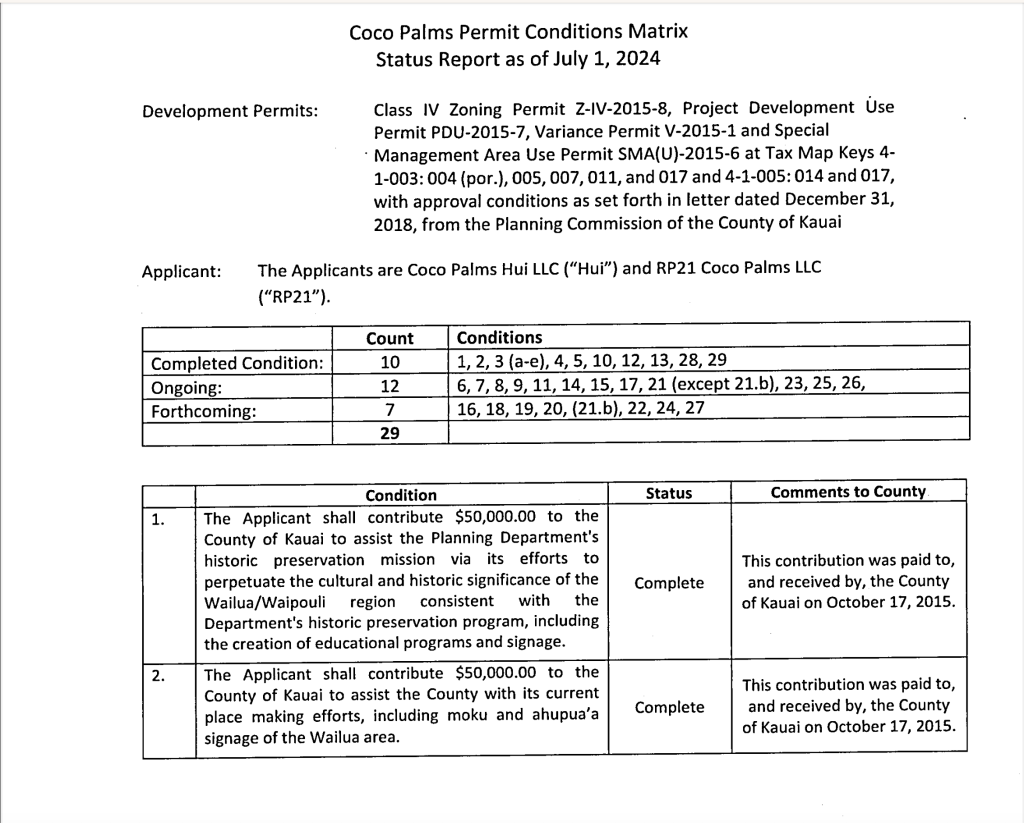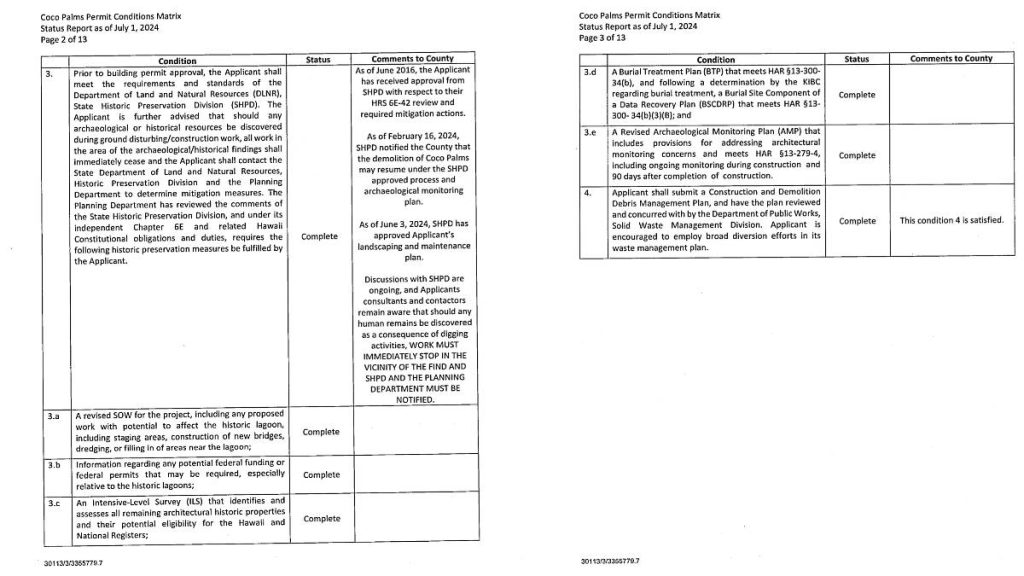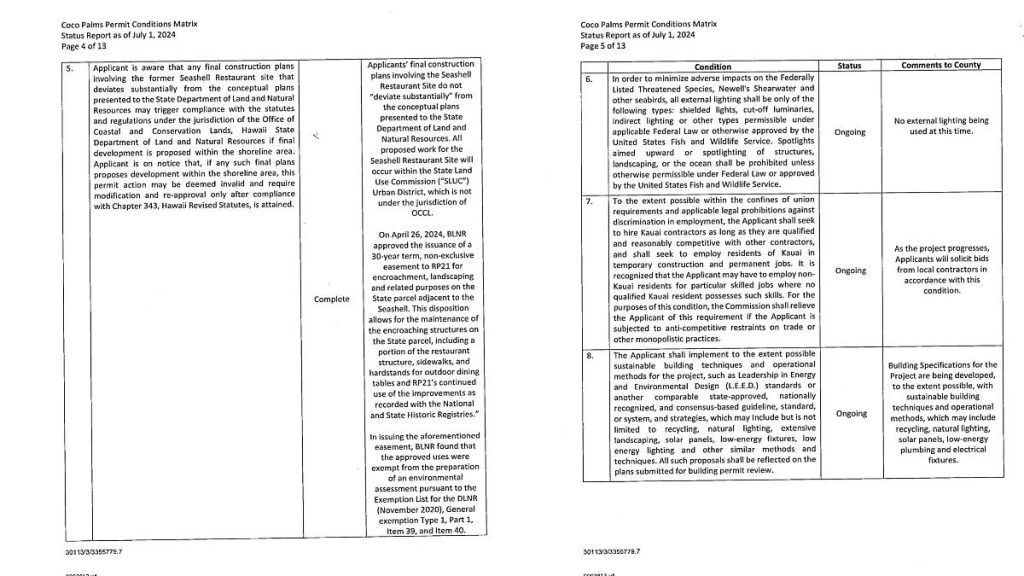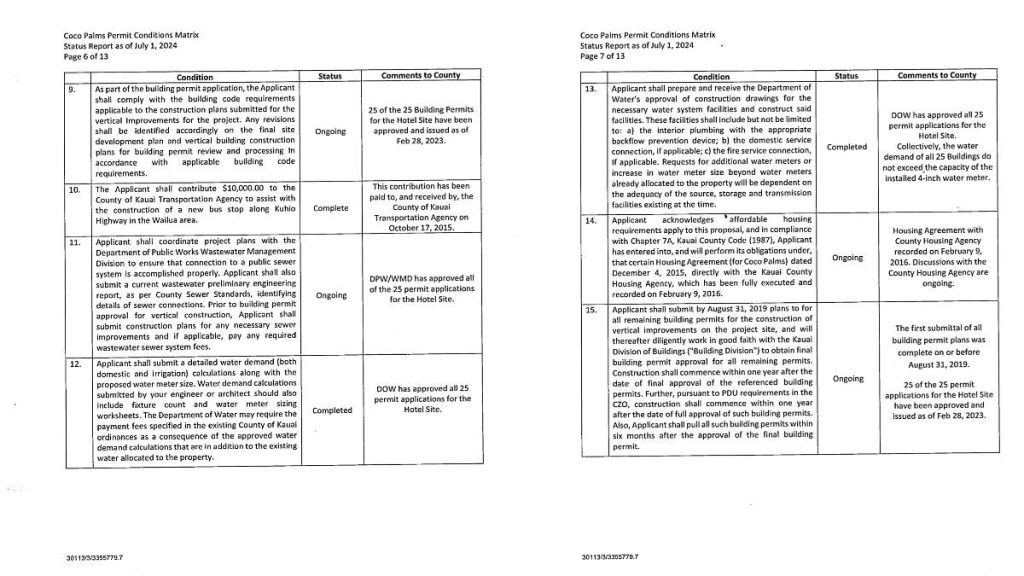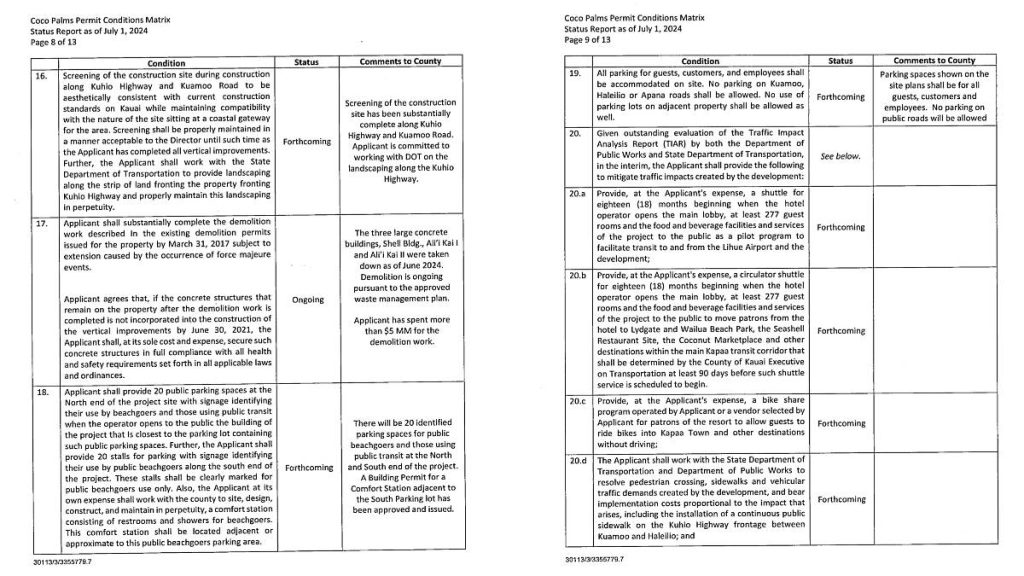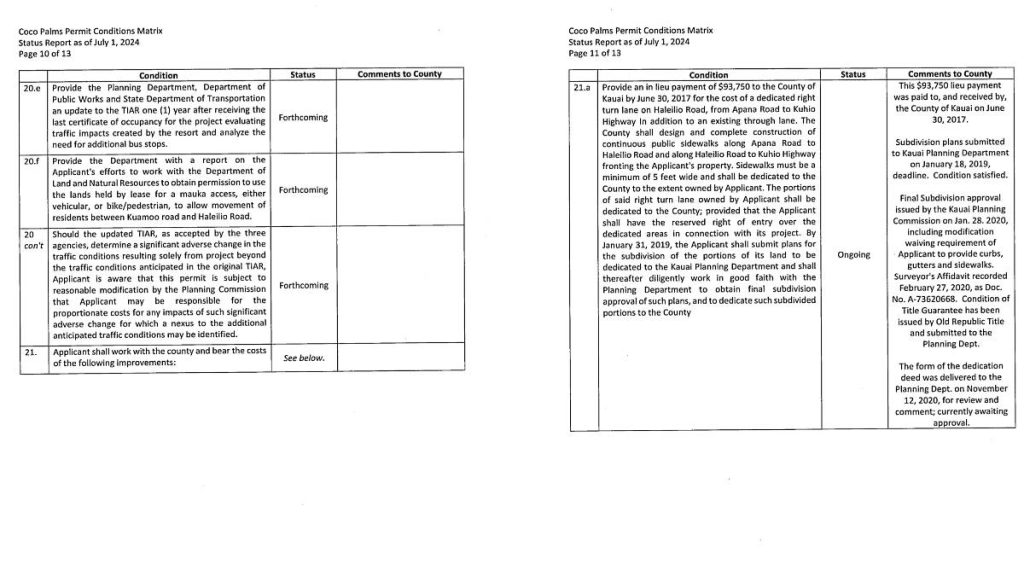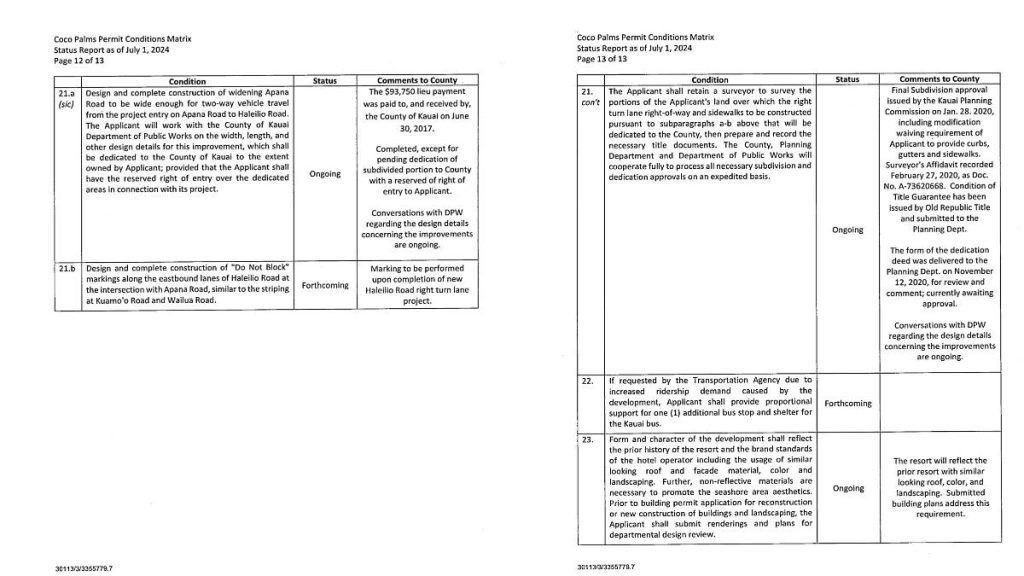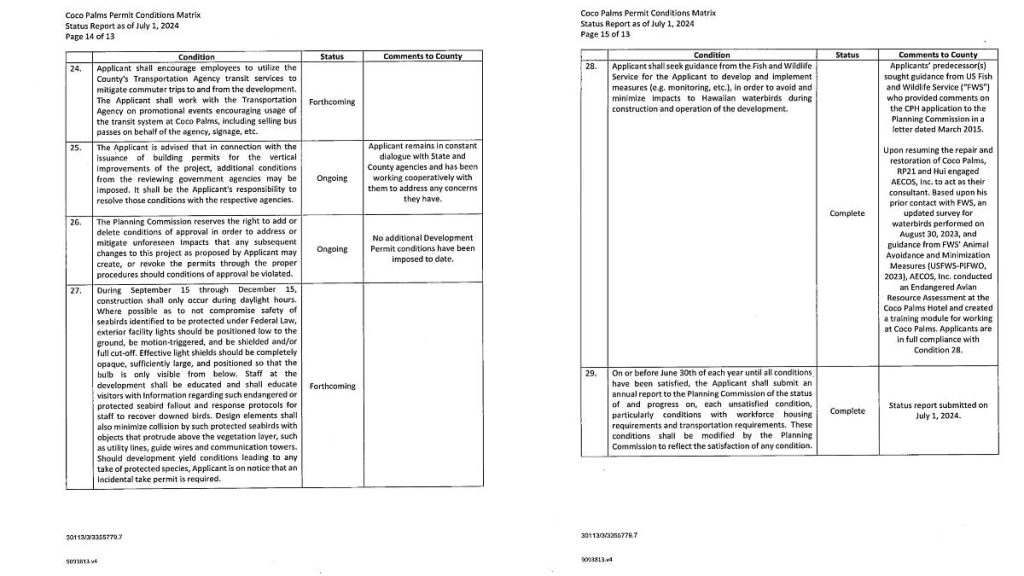Planning Commission approves Coco Palms annual status report amid foreclosure lawsuit
After the Utah developer rebuilding the destroyed Coco Palms Resort showed enough progress on the 29 conditions of its zoning and variance permits, the Kaua’i County Planning Commission on Tuesday approved the status report that allows the controversial project to continue.
Before the 6-1 vote, county Planning Director Kaʻāina Hull told the commissioners that acceptance of the status report is based only on whether permit conditions are being met and if there are any violations of those specific conditions.

Hull said no other concerns are relevant for this part of the approval process. This includes the community’s voiced apprehension about the hotel’s impact, testimony against the project, and the property’s ownership being in limbo due to ongoing litigation.
On Tuesday, the commission reviewed the mandatory status report — submitted on July 1 by Mauna Kea Trask, an attorney for developer Reef Capital Partners — that detailed that 10 conditions were completed, with 12 marked as ongoing and seven as forthcoming.
The forthcoming and ongoing conditions include connecting to a public sewer system, a plan to reconstruct the resort’s former Seashell Restaurant by the beach across the street, working with the county on workforce housing, creating public parking spaces, conducting a traffic impact analysis report one year after construction, and shuttle services transporting people to and from the Lihuʻe airport and the Seashell Restaurant.
Only a few people provided testimony during the meeting, but there was more than 200 pages of testimony submitted to the commission, including from nonprofit groups Friends of Maha`ulepu and I Ola Wailuanui.
Hull said he heard only one potential violation of the permitting conditions during the public meeting, from Kaua’i resident Hope Kallai, who said the developer had left construction materials near the property’s historic fishpond for more than six months.
Hull said this would violate a condition of the developer’s debris management plan.
Attorney Keola Whittaker said he did not know if the materials had been left there for more than six months and would check with his client. Hull responded that the issue would be addressed by the Solid Waste Division.
Earlier in the meeting, Whittaker noted his client Reef Capital Partners has spent more than $5 million to demolish the dilapidated hotel buildings, which have sat in ruins since Hurricane Iniki destroyed the once iconic resort in 1992.
“Rebuilding it is more than about restoring a hotel,” Whittaker told the commission. “It’s preserving histories.”
Whittaker said that he also represents Reef Capital’s corporate entities, current and prior developers RP 21 Coco Palms and Coco Palms Hui.
“We were aware of the litigation and the possibility of the decision from the court of appeals … and to be safe, we do represent both parties,” he said.

Some commissioners questioned whether they should vote to approve the report because of the ongoing foreclosure case that will determine ownership of the property.
“The litigation is not related to this report,” Whittaker said. “It’s not related to our permits. It’s not related to my client’s ability to complete the project.”
While Kaua’i County attorney Laura Barzilai said ownership rights to the property are not decided until the foreclosure litigation has been settled, Hull said the property owner does not matter when it comes to zoning permits or the status report. This is because the permits run with the land, Hull said.
Commission member Helen Cox, the only board member to vote against the motion to receive the status report, said she “felt uncomfortable” that the planning department was allowing the project to move forward despite concerns about parking, traffic, flooding and sea level rise.
While there are conditions stemming from shoreline erosion and traffic analysis studies, Cox was worried they are not required to be addressed until the resort is open with 300 plus rooms.
“I’m really frustrated because it seems like there are issues that are serious enough consequences to the county as well as the developer and to the safety of everyone,” she said.
Hull responded that the Planning Department is not the “alpha and omega” of development, saying it’s an important part, but other entities, including the state Department of Transportation, also are involved in approving aspects of the project.
He told the commission that the 10-year-old conditions — which include connecting to the Wailua wastewater treatment’s limited capacity sewage system and the reconstruction of the “Seashell Restaurant” by the beach across the street — “may seem absurd in 2024.”
Some commissioners questioned the feasibility of the resort that fronts a highway that has become busier over the past decade, and is across the street from Wailua Beach.
“You can barely walk by the [location of] the Seashell Restaurant now,” Commissioner Gerald Ako said.

Cox said she was “just shocked” with the plan for the restaurant due to coastal erosion, adding: “It seems totally impossible to actually have parking over there.”
But Hull said Planning Commission members essentially have no authority to limit or deny the developer’s rights to the permits, which were first approved in 2015 under the Iniki Ordinance. The 1997 law allowed non-conforming structures destroyed by Hurricane Iniki to be rebuilt to their former condition.
“Now, you folks are in the unfortunate situation of being some of the overseers of these conditions and not necessarily agreeing with them,” he said.
At a council meeting about a year ago, Kauaʻi County Council Chair Mel Rapozo questioned how the zoning and variance permits in question could still be valid after being issued to a prior developer nearly a decade ago. And, he suggested hiring an outside attorney, not affiliated with the county or planning department, to review the permits and conduct an outside audit.
Rapozo cited “drastic” changes to the population, sea level, housing and traffic since the last study in 2014.
“I already get traffic coming down (Wailua) Houselots in the morning without Coco Palms there,” he said. “And I can only imagine when you get 350 rooms and 300 people trying to come out of that events center. I don’t know where you’re gonna go.”
At the time, Hull told Rapozo that the Planning Commission had required the developer pay “into various things” between 2015 and 2018, which vested the permits.
“So any attempt of the Planning Commission to deny these permits now comes with a legal responsibility and possibly very large financial responsibility,” Hull said.
In May, no audit had been started, but Rapozo said he was still considering one.
As of Oct. 10, there still has been no audit conducted on the issue.
At the Tuesday commission meeting, Cox said: “How do we not have the right to say, ‘Gosh it’s 2024, and there are some real issues here?’”
Whittaker said his client will be able to manage parking and shuttling, comply with floodplain management requirements to elevate buildings in flood zones, and be “prepared for natural disasters.”
He also says vertical construction will begin by the end of the year.

Following the meeting, County Council member Felicia Cowden, who provided testimony at the hearing, said she was “disappointed that there’s a labyrinth of narrow rules that trap a commission.”
“We have to have the courage of making changes because we track the future into the mistakes of the past,” she said.



